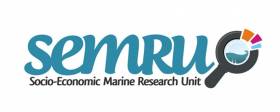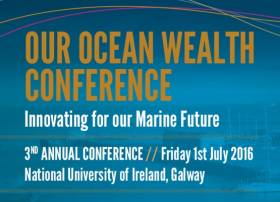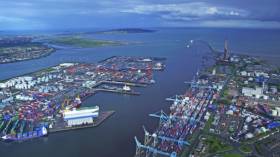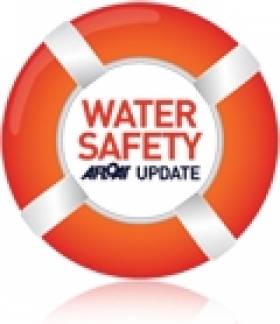Displaying items by tag: Conference
Galway Hosts Atlantic Action Plan & Marine Economics Conferences
#BlueGrowth - Galway's Marine Institute will host the third Irish national event of the support team for the Atlantic Action Plan on Thursday 24 November.
Under the theme of ‘Linking the Atlantic Strategy and Current Funding Opportunities’, this event is aimed at anyone with an interest in developing projects related to the marine and maritime sectors in line with the Atlantic Action Plan. The official event website has more details.
Also on 24 November, Galway’s Glenlo Abbey Hotel is the venue for the seventh Marine Economics and Policy Research Symposium, hosted by the Socio-Economic Marine Research Unit (SEMRU) of NUI Galway’s Whitaker Institute.
This free event will provide participants with an update on a wide range of policy topics related to the marine sector in Ireland, with a particular focus this year on the valuation of marine ecosystem services benefits to society.
Speakers will include Prof Nick Hanley of the Marine Alliance for Science and Technology Scotland (MASTS); Dr Ronan Lyons of Trinity College Dublin; and Dr Kathrine Skoland of International Research Institute of Stavanger, Norway.
More information on the day will be circulated in the coming weeks, and early registration is available HERE.
Our Ocean Wealth Conference 2016 - Registration Now Open
#OurOceanWealth - Registration is now open for the 2016 Our Ocean Wealth Conference at NUI Galway on Friday 1 July.
As previously reported on Afloat.ie, this year's conference will again take place alongside SeaFest, Ireland's national maritime festival, hosted this year in Galway Harbour from 2-3 July.
The full conference agenda is yet to be announced but items of focus will include:
- Progress on the implementation of Harnessing Our Ocean Wealth - Ireland's Integrated Marine Plan
- Into the Blue: Economy and Growth
- Map, Observe, Predict: Innovating Across the Atlantic
- Our New Relationship With the Sea
For more information or to register for the conference visit www.ouroceanwealth.ie.
#AtlanticStrategy - Croke Park will host the third Atlantic Stakeholder Platform Conference on promoting entrepreneurship and innovation in the Atlantic Area on 27 September.
The annual Atlantic Stakeholder Conference is the central hub for stakeholders of the Atlantic Strategy to make valuable contacts and explore areas for co-operation, share information and good practices, promote and identify interesting project ideas as well as funding opportunities and partnerships for their projects.
The annual conference also offers a transnational publicity opportunity to deliver key messages under the Atlantic Action Plan (AAP) and increase awareness of its achievements.
This third Atlantic Stakeholder Platform conference will focus on topics related to Priority 1 of the AAP – Promote entrepreneurship and innovation – emphasising project development so as to promote activities linked with the Atlantic Best Practices and the Atlantic Project Awards, which will be presentedat the conference and for which the closing date for applications is 15 July.
In addition, the conference wishes to give prominence to the international dimension of the Atlantic Strategy embodied in the Galway Statement and its potential support to the blue economy. The agreement recognises that Atlantic research will in many areas be more effective if co-ordinated on a transatlantic basis.
The call for workshops is now open and free registration for participants is available online HERE.
Dublin Port Hosting 2016 ESPO Conference In June
#ESPO2016 - The European Sea Ports Organisation (ESPO) is inviting its members, policy makers and stakeholders to join in the 13th edition of its annual conference, which will be hosted by the Dublin Port Company at The Printworks in Dublin Castle on 2-3 June 2016.
The 2016 ESPO Conference, moderated by broadcaster Claire Byrne, will look into ways to improve the efficiency of maritime transport and ports from different angles.
The first session will focus on the different barriers to the internal market for maritime transport. As maritime policy is at the top of the 2017 European Commission agenda, the ESPO conference aims at preparing the ground for this important year for the maritime and port sector and at feeding further discussions.
Is there a digital agenda for ports? Is there a role for policy? How can ports utilise 'big data' to their benefit? Are we ready to open up the flow of data? How to protect ports against risks of cybercrime? All these questions will be tackled in the second session.
The third session will address the issue of 'game changers' and possible 'game stoppers' when it comes to easing trade. The conference will investigate how TTIP, the trade agreement under negotiation with the US, could possibly benefit ports, on both sides of the Atlantic.
The conference will further zoom into the Chinese 'One Belt, One Road' policy and assess how it might affect European port-hinterland dynamics, as well as the possible impact of a 'Brexit' for UK and neighbouring ports, and how temporary border controls are impacting the European transport and logistics chain.
As usual the conference will close with a policy debate where high-level EU policy makers will present their views on the issues discussed during the conference and enter into a final debate with port authorities.
DG MOVE’s director general Henrik Hololei; Mark Frequin, representing the Dutch Presidency of the Council of Europe; and Pat Cox, former president of the European Parliament and TEN-T coordinator for the Scan-Med Corridor are getting prepared for this session. MEP Knut Fleckenstein will address the conference at the end of day one.
On 3 June, American top economist and influential thinker Jeremy Rifkin will give a keynote address on the theme of 'a Third Industrial Revolution and a Zero Marginal Cost Society'.
The first day's conference sessions will be followed by the Admiral’s Ball, a gala black tie evening celebrating the Lord Mayor of Dublin’s honorary Admiralty of Dublin Port.
The event also launches the Dublin Port Riverfest with a sophisticated evening of fine dining and premium entertainment promised for a guest list of Dublin’s premier business hub and international conference delegates.
Full details of the conference schedule can be found at the ESPO website HERE.
Inland Navigations Historical Society To Host Conference
#InlandWaters - The Inland Navigations of Ireland Historical Society is holding a one-day conference on the Mid-Shannon next Saturday 12 March in Hugh Lynch's Function Room, Tullamore.
The conference is in partnership with the Inland Waterways Association of Ireland, the Irish Boat Rental Association, the Heritage Boat Association and Waterways Ireland.
There will be a variety of speakers on the day, and refreshments will be provided. For further details see the information pack HERE.
Harnessing Our Ocean Wealth Conference 2016 - Save The Date
#OurOceanWealth - NUI Galway will host the third annual Our Ocean Wealth Conference on Friday 1 July.
The previous two conferences – in the inaugural event in Dublin Castle and last summer's in Cork Harbour – have outlined the progress in implementing the Government's 2012 Harnessing Our Ocean Wealth: An Integrated Marine Plan for Ireland.
And like last year's event in Ringaskiddy and Haulbowline, this year's conference will precede the return of SeaFest, Ireland's national maritime festival, in Galway Harbour from 2-3 July.
Further details are available at the Our Ocean Wealth website HERE.
Another upcoming date for the diary is the 26th Irish Environmental Research Colloquium.
'Ecosystem Services for a Sustainable Future' is the title of Environ 2016 at the University of Limerick from Tuesday 22 to Thursday 24 March.
For more information contact Sinead Macken at 086 807 1498 or [email protected] or visit www.environ2016.org
More Info On Next Month's Atlantic Youth Trust Conference
#TallShips - The Atlantic Youth Trust has revealed more details of its inaugural conference and gala dinner in Galway next month, as previously reported on Afloat.ie.
Designed as workshops with input from participants, the day's programme comprises three lively sessions commencing at 11.30am with a break for lunch and the Six Nations rugby match, and rolling into the evening's gala ball.
Session 1 is on 'Educating & Youth Development on the Ocean', a concept something obvious to those who have experienced it first hand yet hard to comprehend for those that haven't. The conference will hear from some of the island's most experience shore-based and ocean-based educators.
Session 2 from 3/30pm is on 'Vessel Design & Construction' - with an emphasis on how to design the best yacht or tall ship to be fit for purpose.
While the focus will be on the Atlantic Youth Trust's proposed new tall ship, the session will hear from a range of experts in traditional and modern design, and will also explore the Galway Hooker One Design concept.
Session 3 from 4.30pm is on the topic 'SeaFest 2016 & Hosting and Attracting Major Maritime Events'. Speakers will include some of the most experienced event managers of high-profile maritime events on the island of Ireland previewing SeaFest 2016 this July and discussing the development of related ideas informed by last year's inaugural event.
The day's events are aimed to attract a wide range of stakeholders and will conclude with the gala dinner.
To book your free place at the conference (lunch not provided) or to book a table or individual place at the dinner, visit the Atlantic Youth Trust website HERE. Special hotel rates are also available.
Westport To Host Sea Lice Conference This September
#MarineScience - The 11th International Sea Lice Conference will be hosted by the Marine Institute in Westport, Co Mayo from 26-28 September 2016, it has been announced.
This biennial gathering of the world's most prominent sea lice research will hear the latest papers, presentations and posters of the most up-to-date research in the field – such as last year's paper that identified salmon farming's impact on wild salmon and sea trout stocks.
The goal of the conference is to bring together leading international researchers, groups and regulatory agencies to foster collaboration and communication on sea lice research and to advance our understanding of the key biological, environmental and management factors associated with sea lice in both wild and farmed settings.
Presenters will be invited to submit papers which may be published in the Journal of Fish Diseases as a special edition.
Registration is now open for prospective presenters, who should also submit abstracts of their research. A limited number of scholarships for students are also available.
For more information visit the conference website HERE.
NMCI To Host International IASST Meeting & Conference
#WaterSafety - The National Maritime College of Ireland, as a member of the International Association of Safety and Survival Training (IASST), be hosting the 67th International IASST Meeting & Conference on 19-20 October 2015 at the NMCI campus in Ringaskiddy.
Registration for the conference, which is also open to non-IASST members, is now live over on the IASST website. Full details on the conference agenda are available HERE.
Follow the NMCI on Twitter, LinkedIn and the official blog to keep up-to-date about the conference.
Harnessing Our Ocean Wealth Conference 2015 - Save The Date
#OurOceanWealth - Ringaskiddy and Haulbowline in Cork Harbour will host the 2015 Harnessing Our Ocean Wealth Conference on 10 and 11 July.
Last June's inaugural event at Dublin Castle outlined the significant progress made to date in implementing the Government's 2012 Harnessing Our Ocean Wealth: An Integrated Marine Plan for Ireland.
This year the conference will be bolstered by events for investors and industry partners such as workshops and a trade fair, while the public will also be welcomed to the associated seafood festival and family fun activities.
More details will be announced as they become available at OurOceanWealth.ie.


























